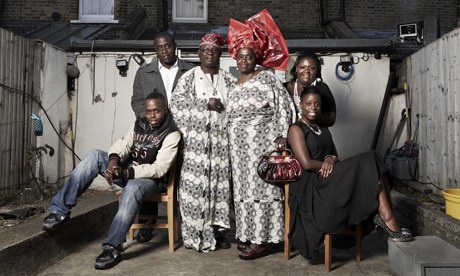Hoxton family stars in BAFTA-winning show

The Family, L-R: youngest son Olu (on chair), eldest son Ayo, dad Sunday, mum Vicky, youngest daughter Ola and eldest daughter Julie (on chair).
The Family, the BAFTA-nominated observational documentary series, has returned to our screens for a new run. This time around, Hackney is part of the show. In this fly-on-the-wall look at the universal themes of family life, cameras are installed in the home of a regular family for eight weeks to document the all-too-familiar squabbles, affections and dynamics of the family unit.
This series features the Adesina family – Sunday, Vicky and their four children Ayo (27), Julie (25), Olu (23) and Ola (15) – who, for the first time in six years, are living under one roof. Since moving to the UK from their native Nigeria in the late 1970s, Sunday and Vicky have raised their family and run a take-away and restaurant business in Hackney. The cultural landscapes of this family often come into conflict, where the traditional Nigerian values of the parents run alongside their now grown-up children’s sense of ‘Britishness’.
This rich backdrop of variation between the two generations is introduced in the opening moments of the first episode, where a camera cuts from mother Vicky, singing a Christian hymn and speaking to Sunday in one of the Nigerian languages, Yoruba, to their youngest daughter applying make-up and listening to chart-topping Katy Perry’s lyrics. “California Girls, they’re unforgettable, Daisy Dukes, bikinis on top”, she sings.
As the camera follows the movements of the Adesinas within their Hackney home (we never see beyond their front door), a portrait of each family member is drawn, providing a foundation for the recognition of similarities and differences between the viewer and this family.
When answering the inevitable questions about their involvement in the filming process, namely “Why on earth would you do such a thing?”, the Adesinas appear to have a laid-back approach. Ayo, the eldest son, self-proclaimed party animal and wannabe rapper, described how his family got on board: “My sister, Julie, was the one who met the researchers first and found out that they wanted to work with a new family. I thought it was a good idea and I guess I pushed it forward, and then before we knew it, there was a crew moving cameras into our house and it was a part of our lives.”
Ayo admits, however, that the personal philosophies behind their involvement and the reactions to the series are not so straightforward. “We chose to do the show for self-discovery, to see what we’re actually like as a family, to look at ourselves, when people rarely have a chance to do that,” he said. “I think for that to happen, we had to be open and honest and go with the attitude of getting as much out of it as you can. But, no doubt, there were some uncomfortable moments as a result.”
Uncomfortable moments indeed. Alongside tense arguments and Julie’s critique of her younger sister’s weight, Ayo divulges intimate details of past relationships. “That’s real life,” Ayo muses.
The ends that this up-close-and-personal exploration of family life serves are unclear and unidentified by the programme itself. However, from a broader social viewpoint, Ayo believes the Adesina’s background and their life in Hackney could tell a story that needs to be heard: “I think generally Hackney doesn’t really get a good time,” he comments. “In a way, there’s nothing but bad press about Hackney. It’s always about crime rates, about being a ‘run-down’ area, about drugs and deprivation. It’s seen as a rough, gritty, concrete jungle.
“But it isn’t about that. Hackney’s just like any other place, with normal people doing normal things, growing up on normal streets tying to make their way in life. I hope people will be able to see that in us.”
Undoubtedly, the Adesina’s hard-working, religious values should readdress any broad misconceptions about Hackney and the people who live in it. There’s room for a type of social engagement with this series that goes far beyond entertainment value or satisfying voyeuristic tendencies.
However you approach this series, its tone is beguiling and comforting. Watching Vicky prepare what must have been a mountain of cakes for Sunday’s 60th birthday and observing Sunday’s continuous bafflement at any piece of technology more advanced than a piece of paper almost lulls the viewer into a quiet recognition of how families function, the roles that exist within them, and the nature of cohabitation between people who have not chosen each other.
If for nothing else, The Family is a must-see for its comic moments and insight into human behaviour. The first episode ends with Sunday realising that for the 60 years of his life, he has been celebrating his birthday on the wrong month. The vast preparations his wife has made for his most recent celebration were ill-timed. He is a month older than he thought. Upon this realisation, he tells son Ayo to keep it to himself. We’ll just keep going as it is. Don’t upset the apple cart. This moment of self-editing proves that Channel 4 doesn’t need to throw too much away on the cutting floor – the family are doing it themselves.
The Family, Tuesdays, 9pm, Channel 4
